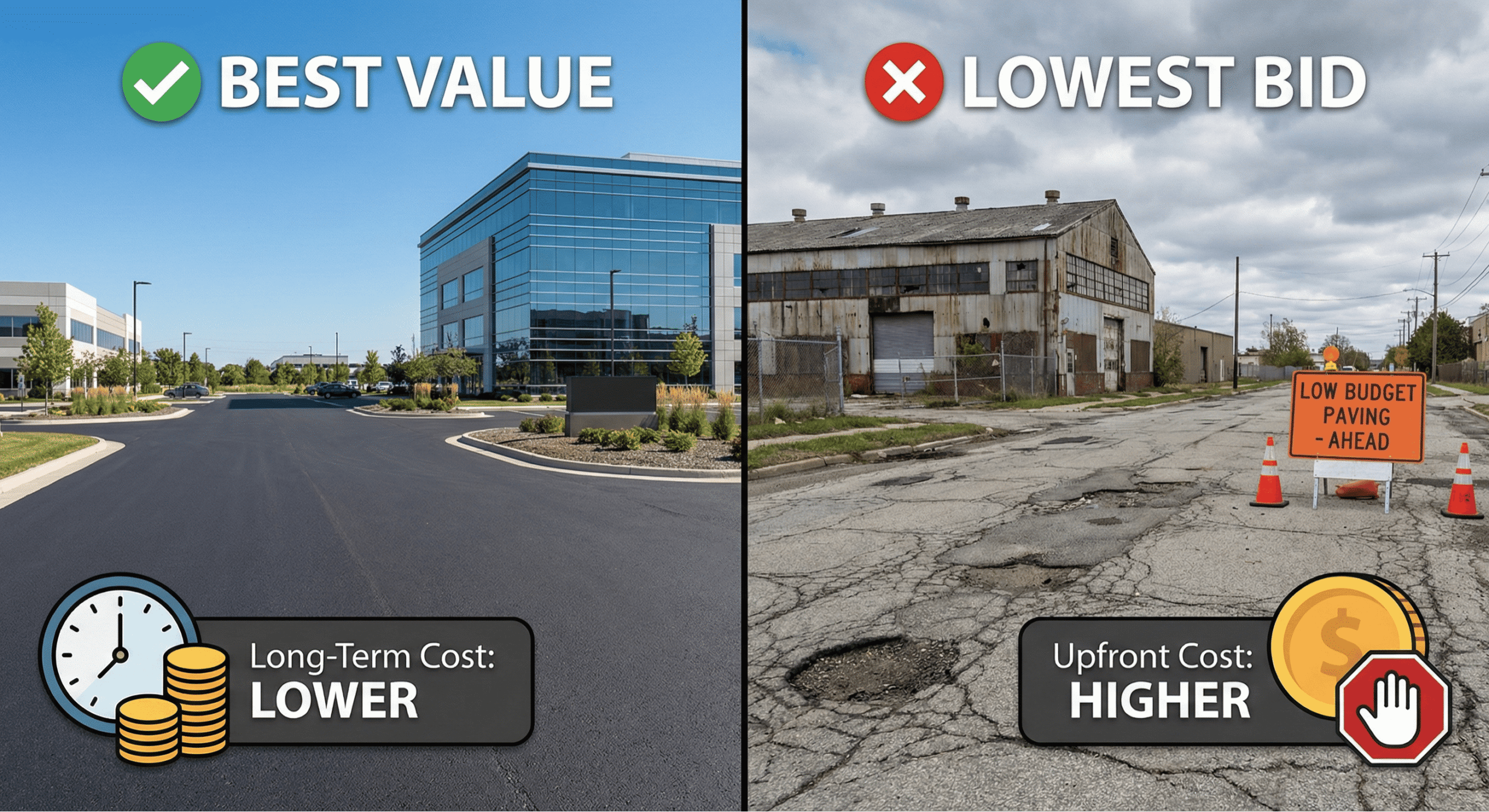
Managing asphalt repairs while keeping your business operational can feel overwhelming. Whether it’s a retail storefront, office complex, or industrial property, pavement maintenance is crucial to customer safety and the long-term value of your property. But closing your doors for repairs can lead to lost revenue, frustrated clients, and scheduling chaos.
The good news is, with proper planning and smart coordination, you can carry out asphalt repairs without shutting down your business. The key lies in understanding your options, communicating clearly, and working with the right contractor who values both speed and safety.
This blog will guide you through the process of scheduling, organizing, and managing asphalt repair work to minimize disruptions. Let’s begin with why timing and planning make all the difference.
Prioritize Timing and Seasonality
The success of your asphalt repair project depends heavily on when you schedule it. Choosing the right time helps minimize disruption and ensures better results.
Plan Repairs When Business Is Slow
Not all times of year are equal when it comes to asphalt work. Temperature, humidity, and business traffic all play a role in determining how and when your repair project should proceed.
Why Timing Matters
Planning during off-peak seasons or slow business hours minimizes disruptions to daily operations. In colder regions, spring through early fall provides ideal time to sealcoat parking lot for asphalt curing and sealing. For warmer areas, scheduling around early mornings or evenings can help avoid high-heat complications.
Smart Scheduling Strategies
- Target off-hours or weekends: For businesses closed on Sundays or evenings, these windows are perfect for minimal impact.
- Plan during shoulder seasons: Spring and fall offer moderate temperatures ideal for both asphalt work and customer flow.
- Avoid significant event dates: Cross-check community calendars to avoid overlaps with local events, promotions, or large deliveries.
Work in Phases
Consider dividing the project into smaller zones. This approach allows you to keep access open to at least part of your lot while work is ongoing. Most contractors can plan phased execution that addresses critical areas first, keeping your business operational and your customers safe. For example, knowing how long does mill pave take can help you plan your phases effectively.
Communicate with Staff and Customers
Planning is only effective if everyone involved knows what to expect. Clear, early communication helps prevent confusion, keeps operations running smoothly, and demonstrates to your customers that their safety and convenience are a priority.
Clear Communication Reduces Confusion
Once the project is scheduled, the next step is to inform your team and customers. Poor communication can lead to customer frustration, missed deliveries, or on-site hazards. But handled well, it reinforces your professionalism and builds trust.
Inform Early and Often
Start spreading the word a week or two in advance. This gives customers and employees time to adjust. For high-traffic businesses, daily updates may be necessary during the repair window.
Communication Tips
- Use signage on-site: Clear visual signs with arrows help direct foot and vehicle traffic safely.
- Update your website and social media: Pin posts and stories that explain the situation and expected repair dates.
- Notify vendors and delivery drivers: Share site access details and alternative entry routes.
- Post updates at entry points: Use simple, polite messaging that reassures clients their safety is your priority.
Keep Your Team Informed
Inform staff about restricted areas and provide safe walking routes or temporary entrances. Encourage questions and address concerns before the work begins. The smoother the internal communication, the easier it is to maintain operations during construction.
Phase Repairs to Maintain Access
Divide and Conquer the Site
The most effective way to avoid a full closure is by working in phases. Phased repairs break your property into manageable zones so you never lose complete access. This strategy is beneficial for larger lots or shared commercial spaces.
How Phased Repair Works
Phased repair means your contractor will close and repair one section at a time while the rest of your property remains usable. Once the first section is complete and safe to access, the team proceeds to the next one.
Advantages of Phased Repair Planning
- Maintain foot traffic and parking: Keeps customer access open to key entry points.
- Supports business continuity by avoiding complete shutdowns of entrances, loading docks, or employee walkways.
- Reduces safety risks: Workers and visitors are separated more effectively by active zones.
Practical Layout for Phased Work
- Zone entrances and exits separately.
- Work around essential access points first.
- Provide temporary signage and cones.
- Schedule repairs for less-used sections first.
Work closely with your contractor to identify a logical sequence based on traffic flow, customer behavior, and emergency access needs. Phased work can be as efficient as it is safe when appropriately mapped.
Select a Contractor Who Understands Operations
Even the best repair plan can fail without the right contractor. To keep your business running smoothly during asphalt work, it’s essential to hire a team experienced in working around active commercial sites.
Partner with a Business-Sensitive Team
Not all contractors are equipped to handle asphalt repairs without disrupting active businesses. You need a contractor who understands access control, phased scheduling, and high-traffic coordination.
What to Look For
- Experience with commercial sites: Request project examples where the business remained operational.
- Flexible scheduling options: Look for crews willing to work off-hours or in tight windows.
- Strong communication skills: Your contractor should provide clear timelines, daily updates, and progress tracking to ensure effective project management.
- Proper signage and safety management: A professional crew brings cones, tape, signage, and traffic control tools.
Choosing the right partner ensures that the work is done efficiently, safely, and with minimal disruption to your business.
Maintain Safety Throughout the Process
Even with careful scheduling and communication, repairs still carry risks. That’s why safety must be a central part of your asphalt repair plan.
Protect Customers, Employees, and Contractors
Safety must remain the top priority throughout the repair process. Whether work is happening after hours or during business time, every person on-site must be protected from hazards.
Essential Safety Measures
- Barrier setup: Use cones, caution tape, and fencing to close off work zones.
- Signage placement: Directional and warning signs should be placed in high-visibility areas.
- Alternative walkways: Create safe pedestrian paths when usual walkways are blocked.
- Lighting for evening work: Make sure the site is well-lit if repairs occur before sunrise or after dusk.
Employee Involvement in Safety
Train your staff to spot hazards and guide customers away from restricted areas. Incorporate them into the safety effort by encouraging proactive communication with clients who may appear confused or disoriented.
Safety not only prevents accidents but also boosts your credibility and professionalism during the repair period.
Frequently Asked Questions
Is it possible to repair asphalt without shutting down business operations?
Yes. With proper planning and the right contractor, asphalt repairs can be completed without a full closure. Phased work, strategic scheduling, and meticulous site management enable your business to remain open and accessible throughout the project.
What scheduling strategies help minimize disruption during repairs?
Schedule repairs during slower business hours or outside of operating times, such as evenings, weekends, or holidays. For busy or shared properties, coordinate with all stakeholders to avoid peak periods and important events.
How can repairs be managed to keep traffic flowing?
Divide the lot into sections and repair one area at a time. Use signage, cones, and barriers to direct traffic safely and keep unaffected zones open for parking and access. Clear instructions help customers and staff navigate the site.
Why is communication important during asphalt repairs?
Good communication reduces confusion and builds trust. Keeping employees, customers, and vendors informed about the schedule and progress helps avoid frustration and keeps your operations running smoothly.
What role does working with an experienced contractor play?
A skilled contractor knows how to plan around business operations. They assess your site, create phased repair plans, and work efficiently to limit downtime. Their experience ensures safety, access, and smooth coordination throughout the project.
Repair Without Interrupting Business
Asphalt repairs are necessary, but they don’t have to interfere with your operations. With proper planning, communication, and a qualified contractor, you can repair your asphalt without having to close your business. By choosing optimal timing, phasing the work, and prioritizing access and safety, you ensure a smooth process that protects both your property and your profits.
Don’t delay needed repairs due to fear of downtime. With thoughtful planning, your business can stay open, your clients can stay informed, and your pavement can stay strong for years to come.
Contact Asphalt Coatings Company for commercial asphalt repair solutions designed around your schedule and business needs. Our experienced team specializes in phased repairs, off-hour scheduling, and customer-first project management.



